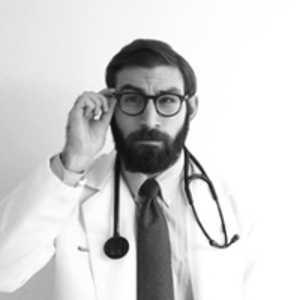Alumni Spotlight
Masis Isikbay

Masis Isikbay graduated from UP in 2012 and is a recent graduate of Harvard Medical School. He is currently in his first year of a radiology residency at UCSF. Masis was very involved on the UP campus including his work in Dr. Prestholdt’s Crab Lab. We asked Masis for some insight into his field and what advice he may have for aspiring pre-health students at UP today:
1. What is the best part of your current job?
It may sound cliche but the best part of my current role is being able to sit down and talk with the patients who I am taking care of.
In today’s practice of medicine these moments can be a rarity between all of the paperwork, rounding, and responsibilities delegated to medical trainees, however they are by far the most rewarding.
Often times much of what you do in the hospital (especially as an intern) can feel nebulous and tedious, however every conversation with a patient where you are able to help alleviate some of their concerns, take time to make them feel heard, or explain some of the unintuitive aspects of medicine feels like a win.
2. How did your time at UP help you with your career path?
UP offered me many things which have been very supportive in my career path.
Perhaps the biggest advantage I have felt spending time at UP has been the relationships I have formed with the faculty/staff at the university. Many of the individuals at the University have served not only as my mentors, but as my friends as well. To this date every time I come back into town I will try and meet up with as many of the people as I can from the University who have been supportive in getting me to where I am today.
Furthermore the undergraduate research opportunities at the University of Portland were very instrumental in shaping my career trajectory and setting me up for success first in my efforts working in science and now in medicine.
3. What are your favorite memories of UP?
Perhaps one of the biggest highlights of my time at UP was my involvement in setting up the “Crab Lab” with Dr. Prestholdt and a few of my classmates.
This was an opportunity to build a research space for students from the ground up and helped me build the confidence to simply put myself out there and try new ideas even if they might initially fail/require revision.
So much of medicine and science revolves around the art of being fluid, constantly revisiting and salvaging suboptimal situations that may present themselves. I felt that this experience of building and working in the Crab Lab allowed me to become more familiar with this concept and also was quite a bit of fun given that these lessons were being learned in the context of working with marine life (and having plenty of excuses to go to the beach during the summer/school year).
4. What advice would you give aspiring pre-health types?
At the risk of sounding more cliche, I think the best advice I can offer to students who are pre-health or pre-medicine is to try and do their best to focus their efforts not simply on getting into professional degree programs but rather on investing in themselves as trainees.
I understand all too well the pressures put on prospective medical trainees (exams, grades, extra-curricular etc) and I am aware of the temptation to focus heavily on boosting one’s resume/CV with the sole purpose of being as efficient as possible in making sure you “check all the boxes” that are classically thought to make an applicant competitive for a specific degree program.
While this can be an effective strategy for gaining admission into a degree program (which of course is an important hurdle to overcome), focusing mostly on what looks good on an application (vs. what is best for your own personal growth) can put you at a disadvantage that will not be actualized until later on in your career.
Often times pre-health students will ask about what they should do to be competitive for professional degree programs, and I think the best advice I can give is that you should invest your time in any outlet that you are passionate about that also will make you a better version of yourself.
The beauty (and sometimes curse) of the health careers is that they will pretty much intersect with most any other discipline in one way or another: science, art, politics, business, mathematics, etc. if you have a passion that drives you, an opportunity to work on something that improves the experience around you, something that demonstrates to you and others what you are capable of explore it (even if you don’t think its the “classic” activity that will get you into a academic program).
Your pre-health training should be about investing in your own personal development and growth. If you do this then by proxy you will be more competitive for whatever you chose to do in the future (both inside and outside of medicine).

